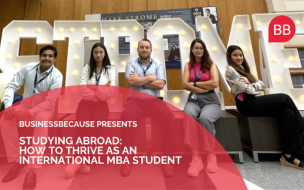While hard, technical skills can be picked up on the job, the soft skills side—leadership, communication, emotional intelligence—has become increasingly relevant.
In the Netherlands, Maastricht School of Management (MSM) has this year revamped both its full-time MBA and pre-experience Master in Management (MM) curricula with soft skills in mind.
Throughout MSM’s one-year MM, the cutting-edge Personal Development Portfolio covers topics like negotiating, interview techniques and body language, and stress management.
In the MBA there is a soft-skill focus in the curriculum where students look at their leadership skills, how to manage cultural diversity and change management for example. These courses are important parts of forming a proper future management. However, MSM also offers a Career and Personal Development Track for MBA and MM students which covers covers resume writing, networking techniques, individual self-awareness and self-development coaching, and introduces students to HR directors from leading firms in the Netherlands and Western Europe.
Hermina Kooyman, Manager of Enrollment and Career Services at MSM since November 2015, is a trained music therapist—her colleague is a trained psychologist. They use general therapy techniques—open questions and mindfulness—in the training of soft skills at the school.
“Companies are looking for critical thinking skills—people who can think and take initiative,” Hermina explains.
“More and more employers want to hire students who can fit into a team. You can learn hard skills, but soft skill development is much more complicated. If a person isn’t able to fit into a team, it’s much more of a problem.”
Every year, Maastricht School of Management’s leadership team reviews the school curriculum, ask employers what they’re after, and adapt accordingly. Lately, there’s been an increase in demand from employers for students with knowledge of data science and analytics—having this knowledge on a resume is an advantage.
“It shows the mindset of a student that they’re looking forward; that they’re different,” Hermina says. But it’s about having the right combination—you don’t want to develop hard skills in a soft skill vacuum. The highly multicultural cohort experience a well-balanced and diverse curriculum which creates an environment for cross-cultural collaboration and learning through group work.
At MSM, 95% of MBAs typically land full-time jobs within six months of graduation. The school has close corporate partnerships with top firms in the region. Microsoft recently held an online training session for its MACH program for MSM MBA students. “Because our students come from such diverse backgrounds, they go into diverse companies,” Hermina explains.
There’s also the advantage of a one-year post-MBA and MM visa available to international students, which gives internationals a year in the Netherlands after graduation to find a job and a visa sponsor (Orientation Year Permit).
Increasingly, Hermina’s seen the motivations of students at Maastricht School of Management change. Increasingly students attempt to start their own companies, she says. Still, the majority leave business school ready to navigate a busy jobs market.
What advice does Hermina have for MBA students looking for jobs in the Netherlands?
“Don’t give up!” she says. “One resume isn’t going to get you a job. Each motivation letter and each resume needs to be tailor-made. When you get that right your chances to get a job increase a lot.
“I tell students to call the companies before they apply. I know HR people want students to call. Make the effort, ask the right questions, and you will stand out.”
RECAPTHA :
56
1f
92
d2








